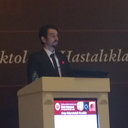Colonic Diverticulosis and Diverticulitis in Renal Transplant Recipients: Management and Long-Term Outcomes.
Słowa kluczowe
Abstrakcyjny
Data regarding management of colonic diverticulitis in renal transplant recipients (RTRs) are limited. This study aims to identify prevalence, risk factors, and outcomes in RTRs with colonic diverticulosis and diverticulitis. Between January 2004 and December 2013, all patients who underwent kidney transplantation were analyzed. Among all RTSs, patients who had a pretransplant colonoscopic diagnosis of diverticulosis and patients with a proven attack of diverticulitis were included in our analysis. There were 1578 RTRs with a mean age of 50 ± 14 years at the time of transplantation. Of these, 409 patients had colonoscopic evaluation and 174 (43%) were diagnosed with diverticular disease. Fifteen (0.9%) out of 1578 developed a primary attack of diverticulitis. Two patients underwent a Hartmann's procedure due to perforation. Among 13 patients who were initially treated nonoperatively, 4 required surgery due to refractory diverticulitis (n = 2) and recurrence (n = 2). Tobacco use (59% vs 48%, P = 0.02), increased age (58 vs 51 years, P < 0.0001), diabetes (33% vs 35%, P = 0.03), coronary artery disease (38% vs 22%, P = 0.001), and autosomal dominant polycystic kidney disease etiology (P = 0.04) were more common in RTRs with diverticulosis. Majority of RTRs with diverticulitis can be managed nonoperatively. Surgical treatment is warranted in patients with perforated, persistent, and recurrent diverticulitis. A special care and follow-up may be needed in RTRs with autosomal dominant polycystic kidney disease etiology, smoking history, and coronary artery disease due to higher risk of diverticulosis and subsequent potential diverticulitis.


